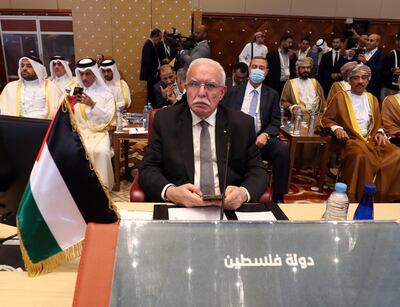The first Arab summit in three years opens in Algeria on Tuesday, when leaders will sit down to discuss the multitude of challenges and crises facing the region.
The coronavirus pandemic and inter-Arab differences had prevented the annual summit from being held in 2020 and 2021.
The annual meeting of the Arab League’s 21 members has increasingly become less and less impactful on a region beset by a host of persistent problems, from the Palestinian-Israeli conflict and the turmoil in Libya, Syria and Yemen, to Iranian and Turkish meddling and, more recently, food security and climate change.
A new addition to the traditional agenda of Arab summits will be the devastating economic fallout from the Russia-Ukraine war, which has led to a spike in the cost of basic food imports.
Given the scale of these challenges, expectations are modest.

“Mistaken is anyone who thinks the Arabs can solve their problems in one summit or that disputes will be settled after years of tension and divisions,” former Egyptian foreign minister Nabil Fahmy said in an op-ed published this week in Independent Arabia, a Saudi-owned online publication.
“I will not fall into the trap of exaggerating expectations about the results of the summit or concluding that its achievements are bright.
“I just hope that its results will reflect some improvements as well as the realisation that the Arab world must take the initiative and that the summit has taken positive steps under very difficult circumstances.”
Mr Fahmy’s attempt to dampen expectations for the summit — Algeria has optimistically called it the “summit of closing ranks” — is borne out by the Arab League’s track record in recent years of failing to resolve the region’s troubles.
This has emboldened some to label the Cairo-based organisation as a mere “talking shop”.
In some ways, the Arab League has over the years been eclipsed by smaller regional groupings, such as the six-nation Gulf Co-operation Council or informal alliances such as those comprising Egypt, Iraq and Jordan or the axis of Egypt, the UAE, Saudi Arabia and Bahrain.

These small groupings, to varying degrees, have been much more effective in pursuing the interests of their members and increasing co-operation and trade when the Arab League has consistently appeared bogged down in disputes.
Further lowering expectations of the Algiers summit, several key Arab leaders will not be attending, including Saudi Arabia’s Crown Prince Mohammed bin Salman, and Jordan’s King Abdullah II.
“Traditionally, the criterion used to judge the significance of an Arab summit is the level of representation,” said Mohamed Anis Salem, a retired career diplomat from Egypt who is now a member of the Egyptian Council for Foreign Affairs, a Cairo-based think tank.
“By definition, a summit must be attended by leaders. If they don’t, it’s a bad indicator.”
Algeria has selected the time of the summit to coincide with celebrations marking the North African nation’s 60th anniversary of its independence from French rule.
It has said it wants the summit to be a resounding success, but Mr Anis does not expect any breakthroughs on any of the problems on the agenda.
The summit agenda, as the case has been for decades, is long and filled with a mix of the region’s intractable problems, such as the Palestinian-Israeli conflict, and more recent concerns, such as climate change, food security, water scarcity, and Egypt’s dispute with Ethiopia over the Arab nation’s share of the Nile waters.
However, Arab League and Algerian officials said the summit will direct most of its attention to the Palestinian question, something that has for decades been a cornerstone of Algiers’ regional polices.

Palestinian Foreign Minister Riad Al Maliki told reporters on Monday that he had received assurances from his Algerian host that the Tuesday-Wednesday gathering would be known as the “Palestine summit”, with the hosts ensuring that sufficient attention is given to the issue.
“This year is one of the bloodiest in Palestine and the war crimes committed by the occupation nation against Palestinians,” said Mr Al Maliki.
He explained that the summit will look at draft resolutions on Palestine gaining full UN membership, international recognition of Palestine and the convening of an international peace conference.
“We are working on securing support and approval for all draft resolutions tabled by the Palestine delegation,” he said.
Mostafa Haroon is a special correspondent for The National. Hamza Hendawi reported from Cairo.

